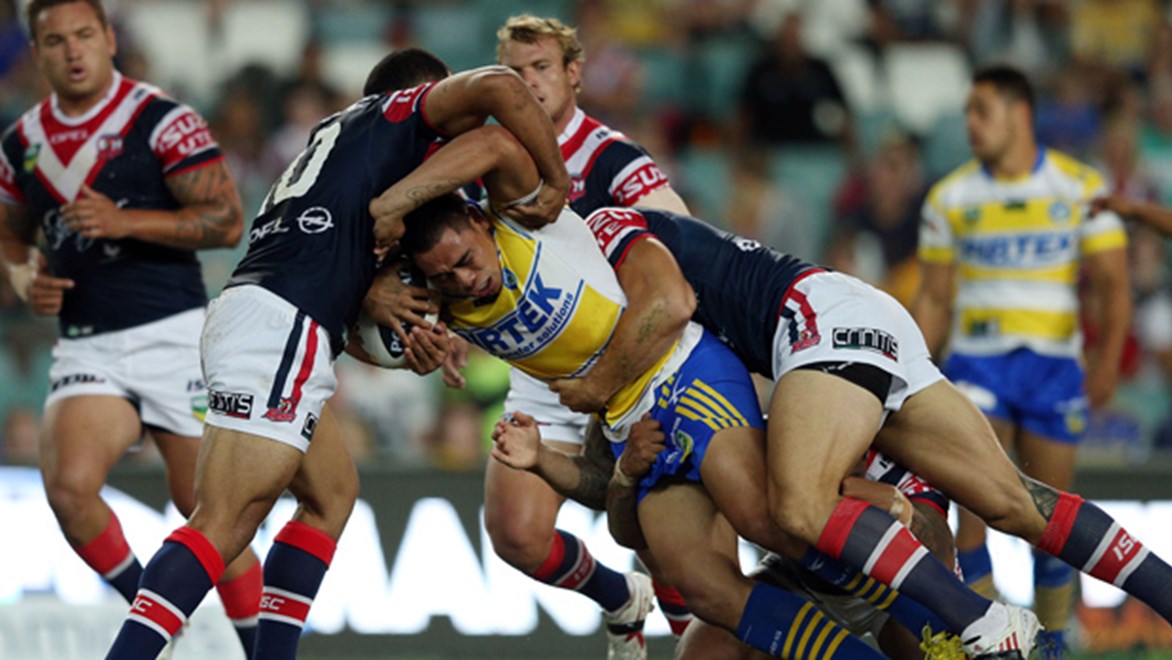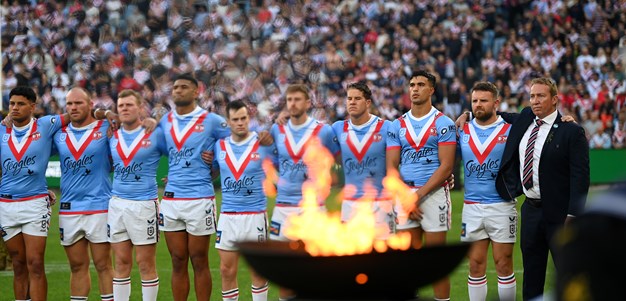

It’s official: the defences of NRL teams are better organised, better disciplined and more effective than ever.
Detailed analysis by NRL.com shows that through the first eight rounds of the 2013 season teams on average are missing fewer tackles than at any time since comprehensive statistics began to be compiled.
In particular, the average missed tackle count for all 16 teams through Round 8 has dipped in each of the past four seasons – with all-time benchmarks set in 2013 for fewest missed tackles and a record low figure for the most misses by a team.
Through the first two months of the 2010 season the average missed tackle count of all teams was 34.9; the best-performed defensive unit was the Storm with 25.1 misses, with the Broncos at the other end of the dial with a whopping 49.2 misses.
In 2011 the average improved slightly to 32.8, with the Storm again the benchmark with 27 misses through Round 8. Souths were the poorest defenders, with 41.9 misses on average.
Last season the defences improved across the board again, with teams averaging 30.1 missed tackles. The Storm maintained their rank as best tacklers with a league-low 23.6 misses; the Warriors were worst with 38.1 misses – but still an improvement on the previous two years.
And so to 2013: this season the missed tackles average across the NRL has plummeted to a measly 24.1 misses – headed by Trent Robinson’s rejuvenated Roosters, who have missed just 17.8 tackles per game so far.
Even the bottom-ranked Panthers with 30.5 misses are less than half a tackle adrift of the all-teams average at the corresponding period last season (30.1).
The Roosters are certainly reaping the benefit of their defensive efforts, conceding just 1.9 tries per game (equal fewest).
The tricolours actually vaulted into top spot for missed tackles after lapses by the Knights and Sea Eagles last week – Wayne Bennett’s unit held the honour with 16 misses before tallying 33 against the Sharks to now sit second with 20 misses, while Manly’s average blew from 17.7 to 21 after 44 missed tackles in their win over the Dragons.
The turnarounds by the Roosters and Knights from last year are staggering: at the corresponding period in 2012 the Roosters missed the sixth-most tackles (31.6), while Newcastle languished in 10th place in the category with 31.4 misses.
Knights assistant coach Rick Stone said it simply came down to repeated defensive work on the training paddock.
“Defence is half your game so whether it’s in the middle, or on the edge, or one-on-one tackles, or tackling in numbers, there are a lot of different scenarios that go on in the game so you’ve got to keep practising those scenarios and working on how you’re going to deal with it,” he said.
Asked about the general trend of all sides across the NRL missing fewer tackles this season, Stone replied: “I think defences are getting better across the board and the thing is that the shape most teams are using is pretty similar, so they are coming up against it at training and working on the same sorts of stuff each week. As a result of that their defensive decisions are a lot sounder – particularly on the edge.
“Technically we’re probably more consistent defenders in the middle these days as well. We get some numbers in the tackle and control the play-the-ball a little bit better. The quicker play-the-balls are probably few and far between.
“As I said, I think it’s to do with most teams playing the same shape so you keep practising and it’s about repetition to make sure you are making some sound defensive decisions.”
That’s not to say the trend will continue inevitably. After all, there is only so far missed tackle counts can drop before they flatten out.
Stone said this year’s stats were probably reflective of the current play-the-ball rules and pointed out that as things naturally evolve the trend could easily bounce back the other way.
“It has got a lot to do with the interpretation of the play-the-ball,” he said. “The speed of the play-the-ball and the consistent speed of the play-the-ball is where you generate some good attack from or you can be a good defensive side. That’s really the fulcrum for most things. If it’s quick it’s hard to defend – but if you’re in control, you can get yourself sorted.”

